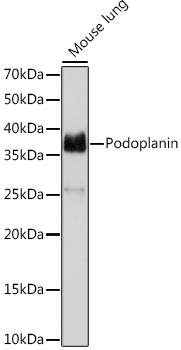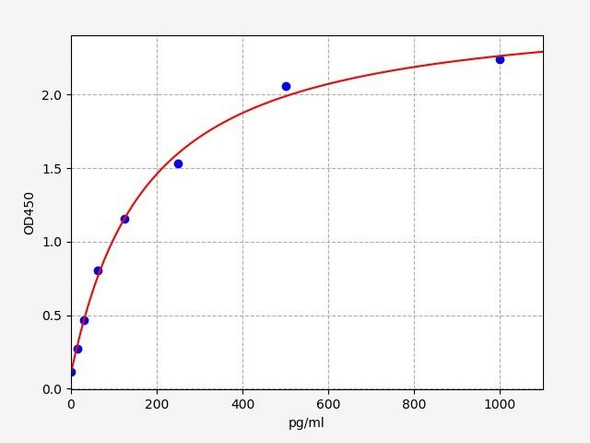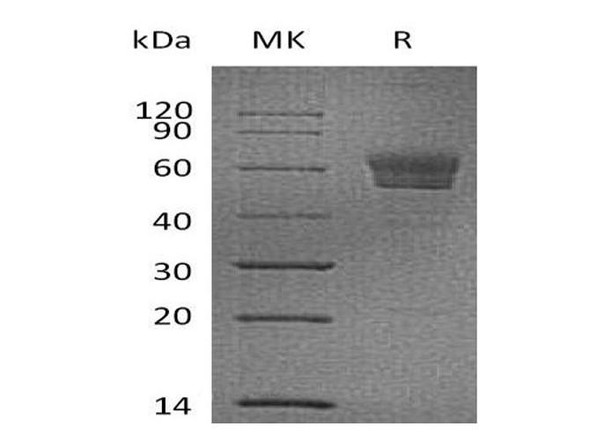Description
Anti-Podoplanin Antibody (CAB9242)
The Podoplanin Rabbit Monoclonal Antibody (CAB9242) is a valuable tool for research involving podoplanin, a cell surface glycoprotein known for its involvement in cancer progression and lymphatic vessel formation. This antibody, produced in rabbits, exhibits high reactivity with human samples and has been validated for use in various applications, including immunohistochemistry and flow cytometry.Podoplanin, also known as T1α, is a marker of lymphatic endothelial cells and has been implicated in tumor invasion and metastasis in various types of cancer. Its role in promoting tumor cell migration and inducing platelet aggregation makes it an attractive target for studying cancer progression and developing targeted therapies.
By utilizing the Podoplanin Rabbit Monoclonal Antibody (CAB9242), researchers can accurately detect and analyze podoplanin expression levels in tumor tissues and other experimental samples. This antibody's specificity and reliability make it a valuable tool for exploring the role of podoplanin in cancer biology and evaluating its potential as a therapeutic target in cancer treatment approaches.
| Antibody Name: | Anti-Podoplanin Antibody |
| Antibody SKU: | CAB9242 |
| Antibody Size: | 20uL, 50uL, 100uL |
| Application: | WB |
| Reactivity: | Human, Mouse |
| Host Species: | Rabbit |
| Immunogen: | A synthesized peptide derived from human Podoplanin |
| Application: | WB |
| Recommended Dilution: | WB 1:500 - 1:2000 |
| Reactivity: | Human, Mouse |
| Positive Samples: | U2OS, U-87MG, Mouse lung |
| Immunogen: | A synthesized peptide derived from human Podoplanin |
| Purification Method: | Affinity purification |
| Storage Buffer: | Store at -20'C. Avoid freeze / thaw cycles. Buffer: PBS with 0.02% sodium azide, 0.05% BSA, 50% glycerol, pH7.3. |
| Isotype: | IgG |
| Sequence: | Email for sequence |
| Gene ID: | 10630 |
| Uniprot: | Q86YL7 |
| Cellular Location: | |
| Calculated MW: | 36kDa |
| Observed MW: | 36KDa |
| Synonyms: | AGGRUS, GP36, GP40, Gp38, HT1A-1, OTS8, PA2.26, T1A, T1A-2, T1A2, TI1A |
| Background: | This gene encodes a type-I integral membrane glycoprotein with diverse distribution in human tissues. The physiological function of this protein may be related to its mucin-type character. The homologous protein in other species has been described as a differentiation antigen and influenza-virus receptor. The specific function of this protein has not been determined but it has been proposed as a marker of lung injury. Alternatively spliced transcript variants encoding different isoforms have been identified. [provided by RefSeq, Jul 2008] |
| UniProt Protein Function: | PDPN: May be involved in cell migration and/or actin cytoskeleton organization. When expressed in keratinocytes, induces changes in cell morphology with transfected cells showing an elongated shape, numerous membrane protrusions, major reorganization of the actin cytoskeleton, increased motility and decreased cell adhesion. Required for normal lung cell proliferation and alveolus formation at birth. Induces platelet aggregation. Does not have any effect on folic acid or amino acid transport. Does not function as a water channel or as a regulator of aquaporin-type water channels. Belongs to the podoplanin family. 4 isoforms of the human protein are produced by alternative splicing. |
| UniProt Protein Details: | Protein type:Membrane protein, integral Chromosomal Location of Human Ortholog: 1p36.21 Cellular Component: external side of plasma membrane; filopodium; filopodium membrane; integral to plasma membrane; lamellipodium; microvillus membrane; plasma membrane; ruffle Molecular Function:amino acid transmembrane transporter activity; folic acid transporter activity; water channel activity; water transporter activity Biological Process: alveolus development; amino acid transport; cell morphogenesis; cell motility involved in cell locomotion; cell proliferation; cell-cell adhesion; folic acid transport; lung development; lymphangiogenesis; platelet activation; positive regulation of cell motility; prostaglandin metabolic process; regulation of cell shape; signal transduction; water transport |
| NCBI Summary: | This gene encodes a type-I integral membrane glycoprotein with diverse distribution in human tissues. The physiological function of this protein may be related to its mucin-type character. The homologous protein in other species has been described as a differentiation antigen and influenza-virus receptor. The specific function of this protein has not been determined but it has been proposed as a marker of lung injury. Alternatively spliced transcript variants encoding different isoforms have been identified. [provided by RefSeq, Jul 2008] |
| UniProt Code: | Q86YL7 |
| NCBI GenInfo Identifier: | 215274223 |
| NCBI Gene ID: | 10630 |
| NCBI Accession: | Q86YL7.3 |
| UniProt Secondary Accession: | Q86YL7,O60836, O95128, Q7L375, Q8NBQ8, Q8NBR3, A9Z1Y2 B2R6J8, E9PB68, F6QWX5, |
| UniProt Related Accession: | Q86YL7 |
| Molecular Weight: | 12,421 Da |
| NCBI Full Name: | Podoplanin |
| NCBI Synonym Full Names: | podoplanin |
| NCBI Official Symbol: | PDPN |
| NCBI Official Synonym Symbols: | T1A; GP36; GP40; Gp38; OTS8; T1A2; TI1A; T1A-2; AGGRUS; HT1A-1; PA2.26 |
| NCBI Protein Information: | podoplanin |
| UniProt Protein Name: | Podoplanin |
| UniProt Synonym Protein Names: | Aggrus; Glycoprotein 36; Gp36; PA2.26 antigen; T1-alpha; T1A |
| Protein Family: | Podoplanin |
| UniProt Gene Name: | PDPN |
| UniProt Entry Name: | PDPN_HUMAN |









